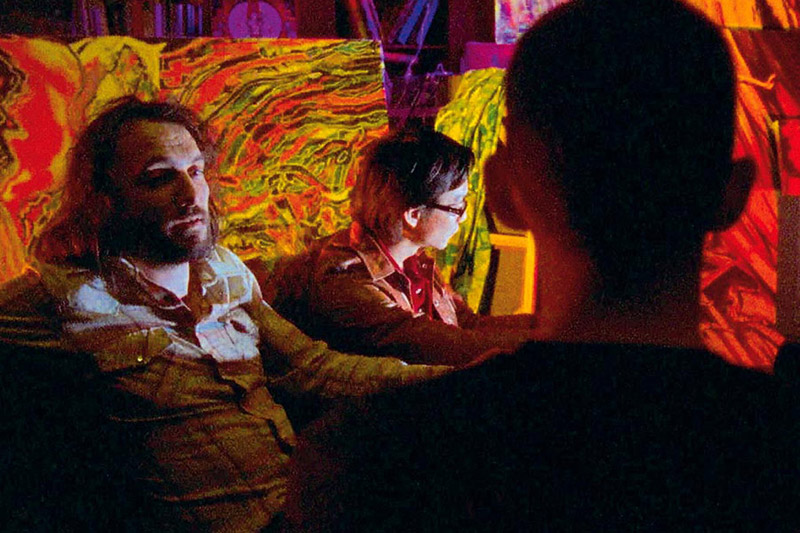
Life is strange. Even the most intuitive person can’t deem themselves as a visionary who is not often perplexed by the complex machinations of life. There are times when we get tired by the random sad twists of life’s plot; we declare that ours is a sad story and always will be. Still, we don’t escape life; maybe the reason we celebrate life with all its unpredictability hides behind the fact that we know it can vanish in an instance.
Again, this complexity also lures us in a way to life’s trap more and more, and in the end, we start to like it. There is no fun without a little adventure, our adventure lies into the anticipation of the unanticipated. Sometimes we succeed and jump into happiness, and most of the times we fall miserably. But the braver the risk, the more compound its interest in the event of success.
We believe that cinema imitates life, or life imitates cinema, according to our personal belief. Independent of our ideological inclination, it is true that cinema is akin to a mirror of life. But again, it depends upon a subjective experience. It can be a tragedy to you and a comedy to another.
We have filmmakers who totally decline the complexity of life, and would rather portray it as an absurdist lyric piece or slapstick comedy, but the brilliant ones create their art as complicated and impenetrable as life itself. This is a piece to celebrate their creativity by highlighting those cryptic films that hypnotize and mess with our brain. Without further ado, here are 10 great films that mess with your head.
1. 2001: A Space Odyssey
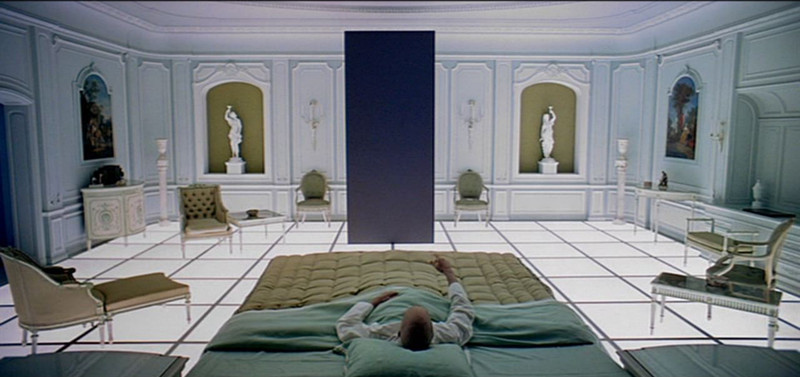
It is a film that describes Nietzsche’s theory of Ubermen in the form of a visual narrative. It was the dummy run of the biggest conspiracy of the Earth: the faking of the moon landing. It was the time when a filmmaker in his prime made a film for his heirs, alerting us about the dangers of artificial intelligence. The possible interpretations of Kubrick’s epic space sci-fi are so abundant that several books can be written in this topic and in fact, there are many on the market.
It is not that for those various possible interpretations of “2001: A Space Odyssey,” but it is tagged as a film that messes with your head. But consider for a moment that even if some of these allegations of the film are true, then imagine how difficult it is to assemble such varied messages and information to present in a bottle and present in the form of a feature film.
Kubrick messes with our heads from the very opening of the film. The introductory 25 minutes of this hallucinatory film include no oral communication; we gasp at excitement and bewilderment about what the film wants to say. It was necessary to equate ourselves to the ape-men who were equally bored and clueless before they evolved to a higher form. Even when the talkie parts start, the dialogue is minimal, with the film’s artificial intelligence looking more human than our own counterparts.
Arguably, it is a film about transcending to a more evolved species, and evolution needs painful mediation; we do the same thing in the span of the film’s runtime. We get to know an anti-gravity toilet, video conference, artificial intelligence computer, and such prophetic declarations were perplexing to us but are now a reality. After contemplating for a long time, we may realize that the film was our own stargate for a higher realization of something new.
2. Donnie Darko

Equally mystifying of the film “Donnie Darko” is the career graph of the director Richard Kelly. After successfully directing the cult film “Donnie Darko,” he quickly vanished from the conscience of the world film connoisseurs apart from a decent track record in the homeland. Maybe stars have something to do with that or it can be our multifaceted reality.
In the last paper before his sad demise, Stephen Hawking demanded that time travel is not possible and so a wormhole is a theoretical concept that will never come to reality. But the timeline can be exchanged without letting us know of the incident, with jet engines carrying the necessary matter for the transformation; the realities are so closely connected and similar that we wouldn’t realize that our fate has been changed.
Kelly designed his tangent universe with a hypnotic score and that is potentially what our designer has made for our life. Or maybe Frank was in hypnosis; Frank is not real but an illusion. Thrown in the mix is the book “The Philosophy of Time Travel” by Robert Sparrow, an inspiring speech that went haywire, and obviously Frank. Even if the spectator fails to decrypt the film’s message, they would have a great time in the film that marks the breakthrough performance of actor Jake Gyllenhaal. Be assured of life after watching the film, maybe there are better realities out there for us.
3. Mulholland Drive
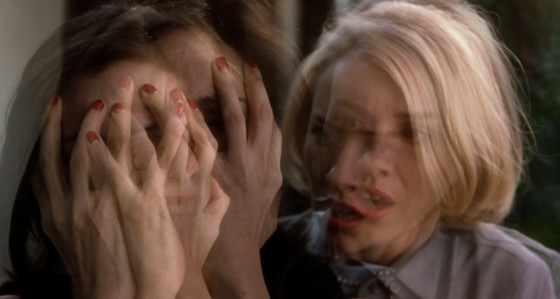
Undoubtedly David Lynch is an uncontested master of the cinematic puzzle. After all, Lynch made his career based on several surreal masterpieces and it’s tough to select a single one as the best-realized version. But Lynch made a film for the new millennium in 2001 that trumped all his previous achievements so far.
Here, the talk is about “Mulholland Drive,” Lynch’s nightmare version of the industry in which he works: Hollywood. He has closely watched the passion of the industry outsiders who crave a single chance to be on the silver screen, and shared compassion for some of the crushed dreams as well. All that pain and rage is imbued in the film, but that is for the audience to find out; Lynch doesn’t make it an easy task.
“Mulholland Drive” was previously arranged for a television series, which ultimately didn’t happen for good. All of those story elements that can constitute a whole television series has fit in this film, so it is plentiful, to say the least.
In that journey, Lynch messes with the audience’s head with the narrative gradually becoming extremely complex to decipher. Employing traditional and modern cinematic devices in a mix, “Mulholland Drive” is a film that comments on the identity crisis of the Hollywood starlet and strugglers alike in the dream town of Hollywood.
4. Cube
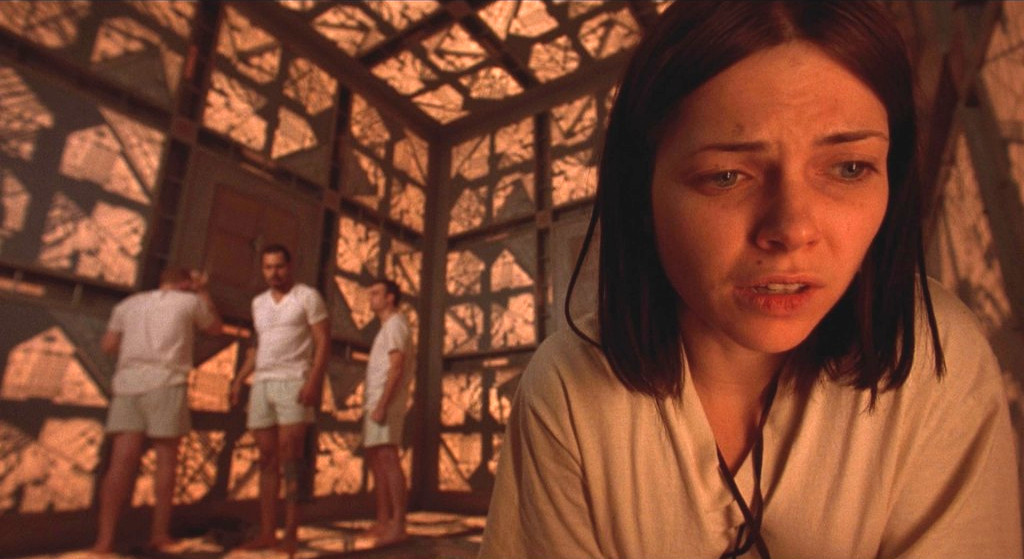
What is existence anyway without highlighting the constant struggle of mankind to make sense of their weird belonging? Vincenzo Natali’s sci-fi chamber drama “Cube” portrays this bout in bold lettering.
Don’t be confused by its sci-fi tropes; in essence, it is as much a meditative piece on the struggle of existence as any slow Russian drama. But it doesn’t reveal its true nature easily; it obfuscates its true identity in the form of a chamber drama and thriller. Five random people suddenly wake up in a cube-shaped room and can’t remember how they got there. They try to escape from the trap and figure out the truth, but the doors always lead to another identical room, albeit with a new light source. Not only that, all of the doors have some booby traps on them, which have to be taken care of first.
As much as the five people feel betrayed in that room, so becomes the condition of the spectators of the film. They want a clue of the future of the characters in the midst of nervous excitement. The climax is a great nexus that would uncover the truths that the film wants to convey in the form of an allegory, but the audience should be extremely patient in doing that successfully.
5. Persona
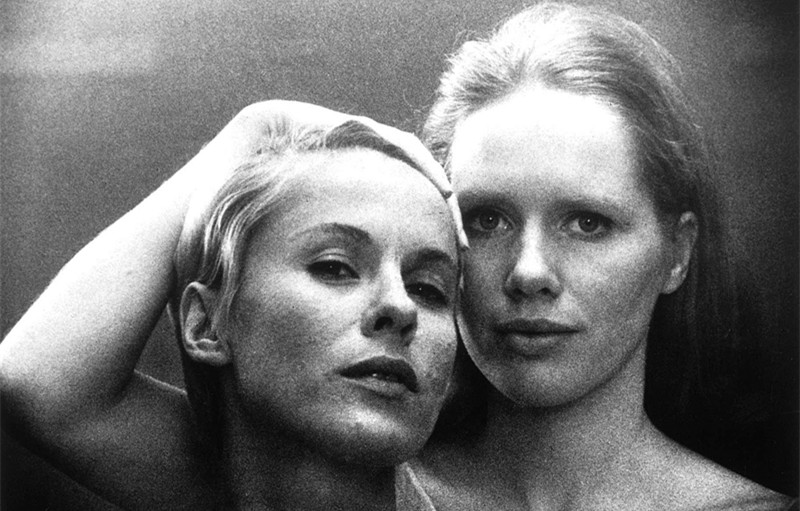
In the very beginning of the film, the audience will understand that “Persona” is going to be a meta-film judging the montage sequence, which consists of projectors, lamps, and reels of film. After the end of the initial five minutes, the audience is now completely baffled. This puzzling state will happen to every viewer irrespective of their intelligence because the film is designed to be that way. It is an impossible task to understand why Bergman sliced frames of the erect penis with violent butchering scene of animal heads.
A child heads toward a cinema screen and tries to touch and feel the person in the frame after waking up from potential catatonia and after that, for the first time, the film starts to build a narrative around two central female figures. One is a screen diva who instantly decided to suspend her oral communication after a sudden collapse, and a blabbering nurse who is in charge of the diva’s health.
They went for a break in recluse at the seashore in the hope of convincing the actress to talk. In their alone time, Alma finds herself to be extremely identical to the actress Elisabeth, and confronted her to get her to talk. Then the screen explodes and it is difficult to determine if they exchanged their souls at that moment.
The favorite interpretation of cinephiles of this mystic film is that here, one character represents the soul, and another, the exterior identity of a single human being. It is easy to understand the turmoil and contemplation of the soul, but it is difficult to calculate who is playing whom in the film.
Watch it twice, allocate and interchange the roles to the two different actresses, and still, the film will make sense. More so because they are the representations of the same person. Bathed in the light of Sven Nyqvist, you will try to judge Bibi Andersson and Liv Ullmann, and scratch your head in confusion.